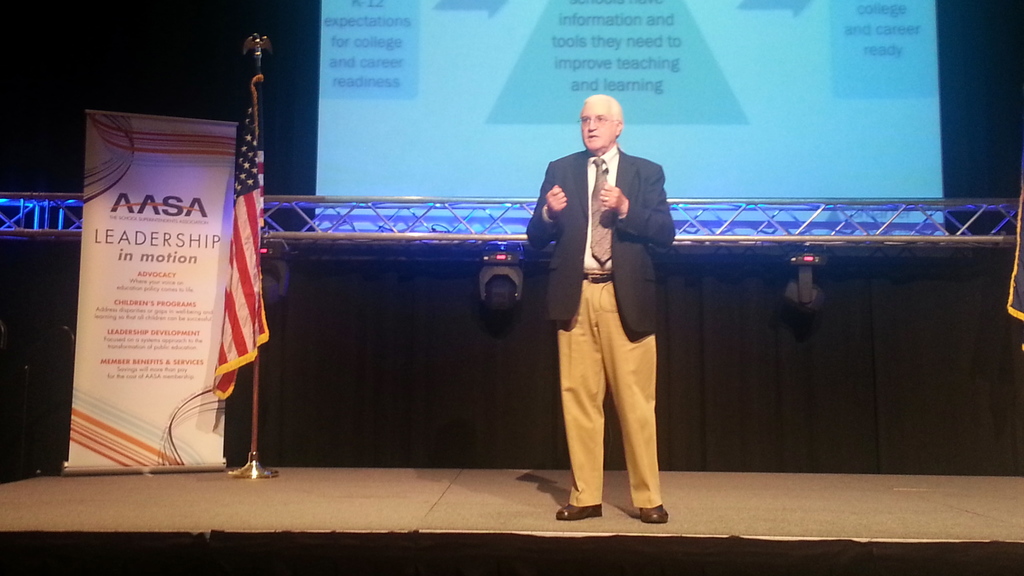The head of the Smarter Balanced Assessment Consortium told school administrators the Common Core-tied test will be a lengthier and more difficult assessment than they have seen.
Joe Willhoft, SBAC’s executive director, spoke to about 440 Idaho superintendents, principals and other educators Tuesday during the Idaho Association of School Administrators’ Leadership Conference in Boise.

Willhoft estimates the new test will take 6 to 8 1/2 hours to complete, spread over multiple days. “There is no question this will be a more rigorous test than you currently have.”
Idaho educators will begin administering “field test” versions of the SBAC assessment at the end of the 2013-14 school year. The following year, Idaho students will complete the full version, and scores will be tied to schools’ and students’ accountability.
SBAC is a consortium of 26 states that is working to develop tests tied to Common Core.
SBAC overview
In addition to the time commitment involved, the test will look and feel different than traditional multiple choice or essay tests students and teachers are used to.
During two hour-long workshops, Willhoft offered the latest insights into the new tests, which have yet to be completely written or approved by the member states.
- The test is adaptive, meaning all students will not receive the same questions. Those doing better will be given harder questions, while those not doing as well will be given easier questions.
- The test will be given online, and schools will have one month at the end of the academic year to administer the tests.
- Students may take the tests on desktops, laptops, Chromebooks and some mobile devices, such as the iPad. The minimum screen size on devices is 10 inches, so smartphones will not be allowed.
- Schools will need to have Internet access, but do not need to have a one-to-one computing ratio to administer the tests. A school with 600 students would be able to administer the test if it has a minimum of one computer lab serving 30 students.
- During the first three years of testing, pen-and-paper tests will be available to schools or districts that are unable to give computerized tests.
- There is no time limit for students to finish the test.
- For the computerized adaptive portion of the test, students will have the option to retake the test if they become sick, or if there is a disruption such as a fire alarm.
- SBAC officials are exploring ways to have computers or artificial intelligence grade the computerized portion of the tests.
- SBAC funding comes from a $175 million Race to the Top grant from the U.S. Department of Education and an additional $3 million comes from foundations.
Administrators’ reactions
Administrators asked tough questions of Willhoft. Several administrators are concerned about transitioning to the new assessments, the time involved, test fatigue and using computers, not educators, to grade portions of the test.
“If software can replicate human scoring already occurring and become indistinguishable (from that), then it will be machine scored,” Willhoft said. “If not, it won’t be. We’ll be guided by the empirical question of can it be or can’t it be done.”
Rob Winslow, IASA’s executive director, said his association’s leaders purposely made Idaho Core Standards and SBAC and major focus of the three-day conference, which continues Wednesday and Thursday.
“Our members made it real clear when they decided what the theme was that this is what they wanted out of a professional development opportunity,” Winslow said. “That was by far the largest item (they requested) and wanting to keep building on that.”
Two Boise School District principals said they found the conference especially helpful with Common Core and SBAC assessments on the horizon.
Still, Grace Jordan Elementary Principal Tim Lowe wants parents to understand that adjustment to Idaho Core Standards and SBAC assessments will take time.
“The wild card is we don’t know what we don’t know,” Lowe said. “I think we will find some surprise we couldn’t anticipate.”
Boise School District leaders have offered support to schools during this time of transition, Adams Elementary School Principal Mark Jones said.
“I do not feel like I’m on an island, on my own, trying to figure it out,” Jones said. “I have lots of resources.”
Both principals said they support Idaho Core Standards, but said there are a few unanswered questions that come with the move. It might take elementary students, especially third-graders, longer to take the tests because their keyboarding skills won’t be as sharp as older students. And both said that, given the more rigorous standards and tests, many scores will likely appear low.
“We have to be careful we don’t get overwhelmed to the point that it paralyses us and keeps us from moving forward,” Jones said. “We have to stay the course.”
